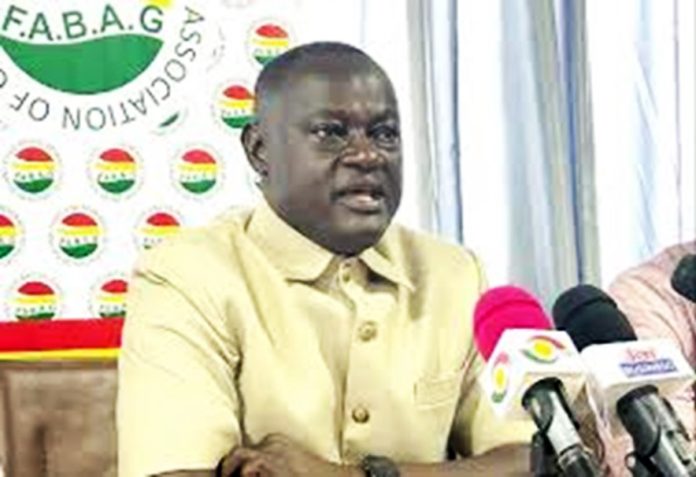The Food and Beverages Association of Ghana (FABAG) has taken a bold stance in urging President John Dramani Mahama and the National Democratic Congress (NDC) administration to begin the much-anticipated Reset agenda by tackling the long-standing inefficiencies at the Electricity Company of Ghana (ECG) and the Ghana Water Company Limited (GWC).
Speaking at a news conference in Accra yesterday, Rev. John Awuni, Chairman of FABAG, highlighted the urgent need for comprehensive reforms in these critical utility sectors before any approval of tariff increases can be justified.
The association warns that failure to do so would unfairly burden both households and businesses with the cost of inefficiency, corruption, and mismanagement.
“We are here to issue an urgent clarion call to His Excellency President John Dramani Mahama and the NDC government to ensure that the Reset Ghana agenda kicks off decisively at the ECG and Ghana Water Company. To approve tariff hikes without deep reforms would be a profound injustice to Ghanaians,” Rev. Awuni declared.
He cited repeated warnings from the Auditor General’s reports and data from the Energy Commission of Ghana that paint a disturbing picture of the ECG’s operational and financial performance. In 2024 alone, ECG reportedly lost 32% of the electricity it purchased, a figure substantially above the Public Utilities Regulatory Commission’s (PURC) benchmark of 21%. This loss reflects an alarming level of inefficiency and theft within the company.
Financially, the situation is dire. Between August 2023 and July 2024, the ECG’s under-recoveries reached approximately GHC 13.6 billion, with the company managing to collect only 43% of its billed revenue during that period. Such a low collection rate severely cripples the company’s ability to operate effectively and invest in infrastructure upgrades.
Adding to the concern is the issue of alleged inflated salaries and benefits paid to ECG employees despite the company’s financial troubles. Rev. Awuni exposed a widespread conflict of interest within the utility, where many engineers and staff have reportedly established private companies that are then awarded contracts by ECG, exacerbating inefficiency and corruption.
“How can a company riddled with such conflicts of interest and financial leakages ever turn a profit? How can tariff hikes solve these structural problems? Every increase in tariffs is like pouring water into a basket,” Rev. Awuni remarked.
The association also drew attention to system failures, noting that billing errors wiped out close to GHC 893 million in just two months. The Auditor General’s 2024 report uncovered multi-billion cedi discrepancies, revealing that ECG collected GHC 11.5 billion in revenue in 2023, but declared only GHC 8.6 billion to the Ministry of Energy and other stakeholders, raising serious accountability questions.
FABAG stressed that without reform, new tariff hikes will simply perpetuate a cycle where the Ghanaian public subsidizes inefficiency and corruption. This situation is untenable for businesses, especially given the government’s vision for a 24-hour economy where reliable power and water supply are foundational.
“Power and water are the foundation costs of production. Without affordable and reliable utilities, the industrial takeoff envisioned by the NDC government’s 24-hour economy agenda will fail,” Rev. Awuni emphasised and added, “There will be no meaningful private sector growth without a massive restructuring of ECG and GWC.”
The association further cited international examples to demonstrate the power of targeted reforms in the utility sector. Uganda’s Electricity Regulatory Authority successfully reduced power losses from 38% in 2005 to 16% by 2016 through concerted reform efforts.
Kenya improved revenue recovery by introducing feeder-level data transparency, prepayment arrangements for government agencies, and tying staff performance to loss reduction. India, through reform and privatisation, slashed distribution losses from over 55% in 2002 to just 7.5% by 2021.
“These success stories prove that with the right reforms and political will, inefficiency can be decisively tackled. Ghana must choose this path or risk following the trajectory of South Africa’s Eskom, which faced rolling blackouts and financial collapse due to delayed reforms,” Rev. Awuni said.
In light of these challenges, FABAG is petitioning President Mahama to launch a Presidential Executive Reform Agenda (ERA) for ECG and Ghana Water Company Limited, anchored by clear, measurable Key Performance Indicators (KPIs) and overseen by a dedicated Presidential Task Force.
“We propose a Presidential Compact between ECG, the Ministry of Finance, the Public Utilities Regulatory Commission (PURC), and the Energy Commission to enforce accountability and ensure performance under the President’s authority,” Rev. Awuni announced.
He concluded by stressing that reforming ECG and GWC is more than a utility issue — it is a matter of national security, economic survival, and a legacy of good governance. He urged the government to act within 30 days to set the reform agenda in motion.
“Efficiency must come before tariffs. Fixing ECG and Ghana Water Company once and for all would be the greatest legacy the Mahama administration could leave behind.
“This will translate to sustainable economic growth, reduced costs of goods and services, and a utility sector that powers Ghana’s progress — not one that drains it,” he said.









